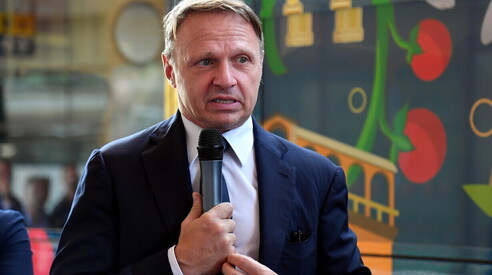Lollobrigida: "Meloni's centrism? We're pragmatic. Our base transcends the right."


Francesco Lollobrigida (Ansa)
where are the Melonians going?
The minister explains the trajectory of FdI. Joining the EPP? "That's not our intention today. But we're working to strengthen the center-right in Europe." And against tariffs, he opens up to Mercosur: "For the Italian economy, there are more opportunities than risks."
On the same topic:
"The applause for Giorgia Meloni is a sign of a solid relationship with the people, even in the absence of a credible opposition. We understand that we must represent an alternative to the left, with pragmatism and without ideological visions." In the aftermath of the Rimini meeting, Francesco Lollobrigida is enjoying the moment. He speaks to Il Foglio as a Meloni supporter, even before becoming Minister of Agriculture. He explains: "We are facing a base that is consolidating and moving beyond the traditional boundaries of the right. This is evident, as demonstrated by the enthusiasm in Rimini and during the visit to San Patrignano. And then there are the demonstrations across Italy."
The radicalism of the past has given way to a more moderate approach. Evidence of centrism? "That's not correct to say," Lollobrigida replies. "There has never been any radical reasoning on our part." No? "If anything, the tone has changed, and it's normal for the tone used in opposition to be different when you're in the majority." Perhaps. But in the meantime, certain events—from support for von der Leyen to Raffaele Fitto's pro-Europeanism, to the appointment of former CISL secretary Luigi Sbarra as undersecretary—seem to suggest a rapprochement with the People's Party. Is this the fate of the Brothers of Italy? "To date, joining the EPP is not our intention. What is needed instead is to build a new European bipolarism, to strengthen the center-right area within the European Union." .
Lollobrigida continues: "There's no point in talking about labels. Europe is a great necessity, but it must become stronger in its ability to address the big issues: migration and defense policies. Draghi says so too, I believe. The difference is that we've been supporting him for a long time."
Let's return to Rimini. The opposition accuses the prime minister of having forgotten the real country, schools, and healthcare. "Meloni delivered a statesmanlike speech. Grounded in reality, free of the ideological visions that characterize the opposition, which seeks to create a purely electoral majority based on slogans," says the minister, recalling economic indicators and employment growth. "The president of the Meeting, Bernhard Scholz, acknowledged this; even those who don't vote for us recognize that Italy is better off today than it was in 2022. We have demonstrated a long-term vision and the ability to engage with the world of labor and volunteers, with farmers and Confindustria."
Another strong criticism concerns the tariffs: Schlein and Conte argue that you're doing nothing to mitigate their effects. "First of all, it's worth remembering that the agreement isn't done and there's room for improvement, for example on wine and Pecorino Romano. On other products like Parmigiano and Grana Padano, we've maintained the same tariff in place since 1964, at 15 percent," says Lollobrigida. "But perhaps we've missed a point." What? "We started working well before the agreement came into force. Tariffs between allies are never appreciated, but I believe they're sustainable in some areas. They're largely absorbed throughout the entire supply chain, paradoxically placing the greatest burden on those who impose them. Of course, they're also worrying given the effects of the devaluation of the dollar, which complicates the situation by weakening US purchasing power. What a good government can do, and is doing, is engage with intermediary bodies and companies, and allocate resources to address the critical issues." What measures are planned for agriculture? "In July, we approved ColtivaItalia, which allocates one billion euros to support strategic sectors such as oil and red meat, and, through the Food Sovereignty Fund, those experiencing critical issues related to various factors. And then, in addition to continuing discussions with the United States, a key market, we are seeking new commercial outlets."
Which areas are you referring to? "Asia, Thailand, for example, where the Women's Volleyball World Cup is underway. The national team shot a commercial on Thai TV to promote pasta." And South America? Could Mercosur be a resource? "We have no prejudices. I believe Mercosur presents more opportunities than problems. I'm thinking of wine among the sectors linked to agriculture. This is the starting point." But? "There are other sectors in the agricultural sector that risk very serious problems. For this reason," Lollobrigida concludes, "I believe the EU must seek an agreement that doesn't involve sacrificing anyone and puts the criterion of reciprocity at the center, in production and labor standards."
More on these topics:
ilmanifesto





